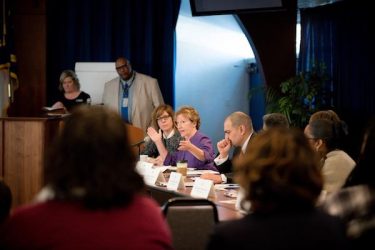
Even as we anticipate 2020 and the big role North Carolina will play in national elections, the votes that may have the most impact on our day-to-day lives don’t have anything to do with Washington politics. Many people don’t realize that their state representatives, local and regional judges, city council, county commissioners, and various other local officials deserve a lot more attention than they get.
For instance, school boards. North Carolina has 115 school districts and a total of 761 board members across the state. I would argue that those local school board members are some of the most important people we elect. These are the people who hire and fire superintendents and who set the tone and expectations for the hiring of teachers and principals. When there are problems with school personnel that require administrative hearings, school boards are responsible. They hold final authority over student assignment and over student suspension or expulsion.
School boards set policies for how schools will be administered. They don’t run the schools but they are responsible for holding to account the administrators who do run schools. School boards must work with state and local governments on budget, school buildings and other facilities, and school calendars. They set the priorities and policies that determine which courses are offered, and which books, technology, and other tools are purchased for use in those courses. They decide how kids are assigned to schools and where boundaries are drawn. How well they all work together can create harmony or conflict, and can affect the quality of life in a community.
School boards affect the racial and socio-economic make-up of our schools, because they are responsible for school assignment. If we believe that equality of opportunity is important for all kids, then we have to also believe that school boards matter. Where kids go to school is important in determining how long they are on school buses every day, which in turn affects the family time they have before and after school.
School boards have significant influence over how tax dollars are spent and what is or is not funded in local district schools. While the money comes from federal, state, and local sources, school boards develop budgets and allocate funds to schools within their districts and for particular projects.
Schools are one of the most important partners parents have in helping their children develop into adults. Granted, parents are responsible for teaching their kids, instilling right values, and developing character, but kids spend more time at school than they do in any other single place, other than home. Good schools can help children to grow into independent adults who engage well with the world around them and act with integrity. Of course, bad schools can do the opposite.
School boards often serve as a first step for people considering higher office. The people we vote onto the school board this year may be in the State Senate, State House or other higher office several years from now. There, they’ll be voting on school-related issues like education budgets, school choice, and sex education, as well as abortion, marriage, gambling, taxation, and other issues that are important to North Carolina families.
All of that matters tremendously.
School boards aren’t all elected on the same cycle. Some are elected in the spring, and others are as soon as this October. Over the next 18 months, almost all of us will have the opportunity to vote for the school board members who will oversee our local school systems, set policies and budgets, determine student assignment, hire and fire administrators, and ultimately set the tone for much of what happens in our public schools. So do your research. Find out who’s running for school board and listen to what they have to say. Think seriously about who you’re choosing to lead our public schools, and walk into the voting booth knowing exactly who you’re going to vote for way down the ballot. School boards, and the kids their decisions impact, are far too important for us to ignore.
POVs are point of view articles from NC Family Staff and contributors.